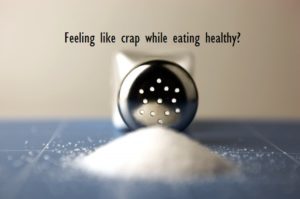
A lack of sodium that is!
“Well… my friend says it’s because I’m detoxing.” Maybe. But check your sodium (salt) intake.
You may not be getting enough salt!
Some experts refer to salt as a toxicant. The truth is that salt is a nutrient. Just like other nutrients, salt bears what investigators refer to as a “U-shaped curve.” Meaning that there isn’t only a higher level intake that is harmful, but a lower level intake as well [1].
That curve shifts left or right depending on several factors. The one we’ll be discussing briefly is dieting.
Cleaning up your diet often results in two important conditions that are set.
First. Your intake of salt goes down. This occurs largely from a reduction in boxed and bagged foods. Some investigators have estimated that up to 77% of salt in western diets is derived from processed food [2].
Second. Your intake of total calories and refined carbohydrates decreases. This causes a reduction in levels of a hormone you are likely aware of called insulin. What you may not be aware of is that insulin is an antinatriuretic factor. In reality other hormones play a role, namely glucagon, but for simplicity we’ll stick to insulin.
Insulin keeps salt from being excreted by your kidneys. Water likes to follow salt. So when your salt goes into the toilet, so does a lot of your water.
Given this role, it makes sense that fasting and low calorie diets increase the amount of salt we put in our urine. And refeeding, particularly carbohydrates, appears to increase the retention of sodium [3].
So when dieting, you likely have less salt coming in and more salt going out.
So what, you say?
This matters because it could explain why you’ve been feeling like crap while dieting. It could explain why you intermittently binge on carbohydrate-dense, salt-rich food and ruin success. And we want you to be successful long term.
When too much salt and fluid is lost you get hypovolemic. Your body will do it’s best to defend your plasma volume via several mechanisms. But oftentimes health status and other factors impair these balancing acts.
Signs include of hypovolemia
Dizziness
Fatigue
Nausea
Brain Fog
Pallor
Orthostasis
Essentially, you just feel and operate like crap. And guess what your body does? It increases your craving for salt. Some investigators believe humans have what is referred to as a “salt appetite,” or physiology that regulates our desire to seek out salt [4].
And if you need it, it’s likely these components of your brain are going to cloud your ability to use your frontal lobe. All of a sudden it doesn’t matter as much if the salt is in a gluten-rich, sugary, matrix. Or in potatoes, deep fried in rancid oil. You need your salt!
So how do you keep from derailing? The solution is to have some salt handy.
Using an app that allows you to track micronutrients like cronometer might be helpful, so you can relate how you feel with your salt intake.
At any rate, you could start with ¼ teaspoon with each of your meals. If that doesn’t do the trick, try another ¼ teaspoon in every 12 ounces of water you drink. Titrate up in ¼ teaspoon increments as needed. When do you stop? When you either find a sweet spot where you feel good, or you’re taking in greater than 2 teaspoons. If you made it to 2 teaspoons with no result, then other questions need to be asked.
I’ve found that during prolonged fasting I maintain my best cognition and energy levels sometimes in excess of 8 teaspoons! Just to give you some perspective on how much salt requirements can increase!
What about blood pressure? What about cardiovascular events? Some of you may have caught on and had an “a-ha!” moment. And you might ask yourself whether or not most cases of hypertension are a result of hyperinsulinemia [5].
I do agree with that assertion.
What causes hyperinsulinemia? Several things, but before we go investigating elsewhere, the most likely considerations are chronic overfeeding and micronutrient deficiency from processed food consumption.
That being said, there are folks out there with genetic aberrations, like Liddle’s syndrome, affecting the tubular machinery in the kidneys. Meaning the normal way out for salt doesn’t work right. And these folks do need to be cautious with their salt intake. When making a change like this, it’s a good idea to involve your doctor and regularly check your blood pressure!
Further Reading
[1] O’donnell, Martin, et al. “Urinary sodium and potassium excretion, mortality, and cardiovascular events.” N Engl J Med 2014.371 (2014): 612-623
[2] Mickleborough, Timothy D. “Salt intake, asthma, and exercise-induced bronchoconstriction: a review.” The Physician and sportsmedicine 38.1 (2010): 118-131
[3] Kolanowski, J., et al. “Influence of glucagon on natriuresis and glucose‐induced sodium retention in the fasting obese subject.” European journal of clinical investigation 7.3 (1977): 167-175.
[4] lhadeff, Amber L., and J. Nicholas Betley. “Pass the salt: the central control of sodium intake.” Nature Neuroscience 20.2 (2017): 130-131
[5] DeFronzo, Ralph A. “Insulin and renal sodium handling: Clinical implications.” International journal of obesity 5 (1980): 93-104